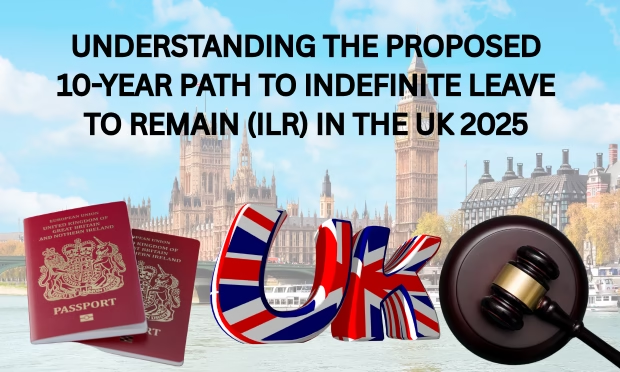The UK Government has announced plans to significantly reshape the pathway to permanent residency by extending the qualifying period for Indefinite Leave to Remain (ILR) from the current five years to ten years for most visa routes. Under this proposal, migrants would need to demonstrate 10 years of continuous lawful residence—meaning time spent in the UK with valid immigration permission and without extended absences.
It is essential to note that this is not law yet, but a proposal that signals a major shift in the UK’s long-term immigration framework.
Why This Change Is Being Proposed
The idea of a longer settlement period was first introduced in the Government’s May 2025 White Paper, which recommended doubling the residency requirement. At the Labour Party Conference on 29 September 2025, giving the public a clearer picture of what the future settlement system may look like.
What’s Newly Announced?—The “Contribution-Based” ILR Model
The Home Secretary outlined a vision for a “contribution-based settlement system”, where applicants could potentially reduce the 10-year requirement by demonstrating positive contributions to the UK.
Examples of factors that may allow migrants to shorten the wait include:
Continuous employment
Regular National Insurance contributions
Not claiming certain benefits
Strong English language proficiency
A clean criminal and immigration record
Demonstrating community involvement or voluntary contributions
However, the proposal also suggests that some individuals may have to wait longer than 10 years or could be barred from applying for ILR altogether. The criteria for these decisions have not yet been confirmed.
What’s Newly Announced?—The “Contribution-Based” ILR Model
The Home Secretary outlined a vision for a “contribution-based settlement system”, where applicants could potentially reduce the 10-year requirement by demonstrating positive contributions to the UK.
Examples of factors that may allow migrants to shorten the wait include:
Continuous employment
Regular National Insurance contributions
Not claiming certain benefits
Strong English language proficiency
A clean criminal and immigration record
Demonstrating community involvement or voluntary contributions
However, the proposal also suggests that some individuals may have to wait longer than 10 years or could be barred from applying for ILR altogether. The criteria for these decisions have not yet been confirmed.
What This Means Right Now
- No changes have taken effect yet.
The Government has confirmed that these plans will undergo public consultation later this year. Existing ILR rules remain fully in place.
- Your current ILR application will be assessed under today’s rules.
Nothing changes until new legislation passes.
- If you will soon qualify for ILR, consider applying early.
Applications made before any rule change will be processed under current law.
- Stay informed, not alarmed.
This is a proposal—not yet policy.
Public consultation will allow individuals, charities, immigration specialists, and organisations to submit their views on how the proposed changes may impact migrant communities.
What Remains Unclear?
Despite the announcements, many important details are still unknown, including:
1. How exactly migrants can “earn” a reduction below 10 years
What counts as an eligible contribution, how many years are required, and what evidence applicants must provide?
2. Who might be barred or required to wait longer?
What behaviours or circumstances could delay or prevent ILR?
3. Will the rule apply to people already in the UK?
Will current migrants on 5-year routes be moved to a 10-year route, or will changes apply only to new applicants?
4. How will “positive contribution” be defined?
Will income level, tax contributions, volunteering, or length of employment matter?
5. What about those who cannot work or volunteer?
People with disabilities, long-term health issues, carers, or others facing barriers must be considered in future guidance.
What You Should Do Now
1. Stay calm and stay informed
Avoid misinformation from social media. Always cross-check with trusted sources.
2. Maintain your immigration status
Submit visa extensions on time and comply with your visa conditions.
3. Keep records
Document employment, NI contributions, training, volunteering, or community involvement. These may become valuable later.
4. Seek professional advice if unsure
If your ILR route or timeline may be affected, speak to a qualified immigration adviser.
5. Engage in the consultation
Your voice can help shape policy. Follow updates and participate if invited.
Summary
No changes to ILR have taken effect yet.
A public consultation is expected later this year.
The Government proposes extending most ILR routes to 10 years, with a possible contribution-based reduction system.
Exemptions will remain for British partners, domestic abuse victims, and EU Settlement Scheme residents.
Many crucial details remain unknown until the consultation is completed.
This is a period of uncertainty for many migrants, but staying informed, prepared, and proactive will help you navigate any future changes with confidence.




